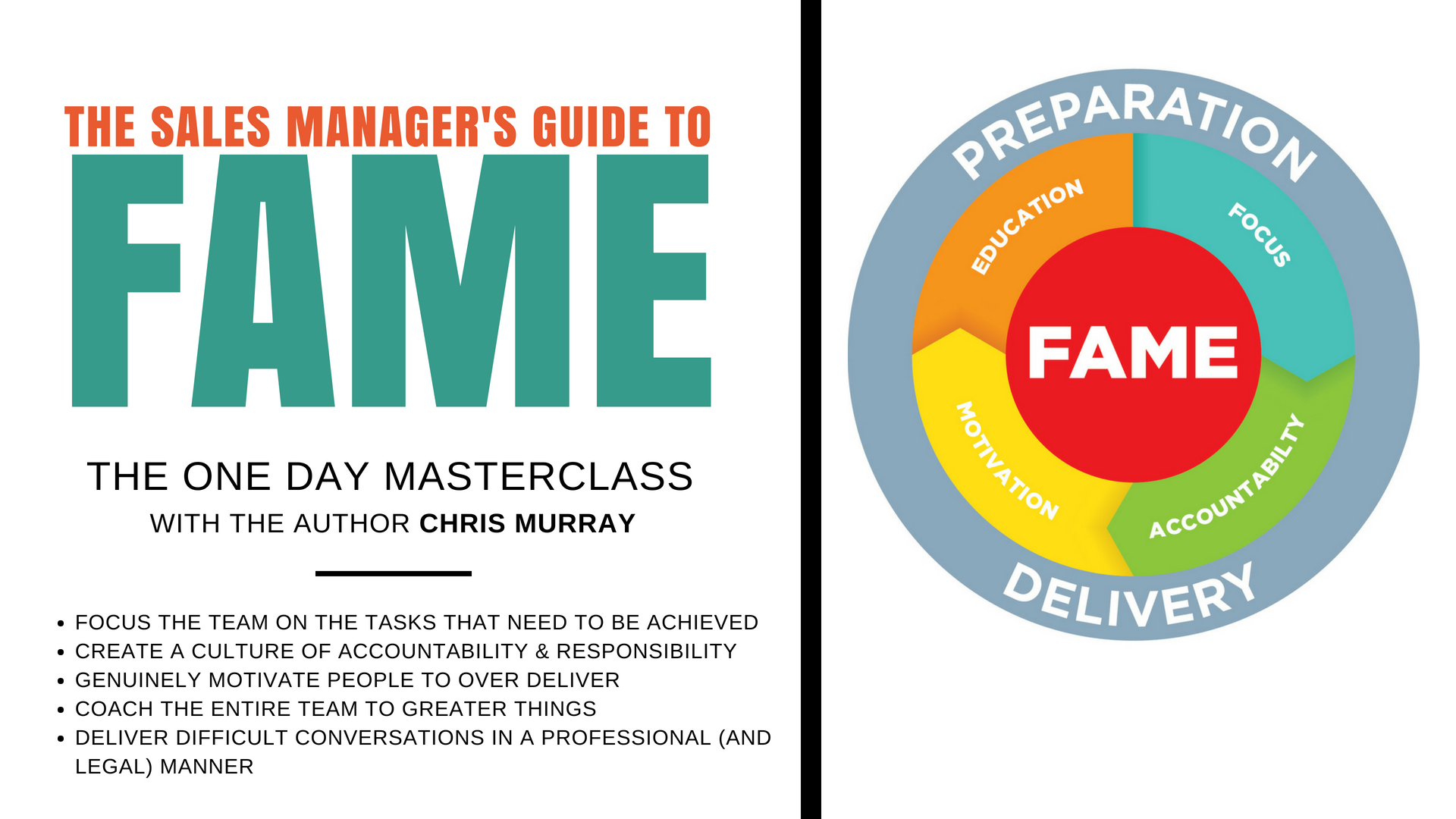Part 4: The Manager Who Improved the Entire Team
Many people consider the coaching advice and templates that I give out at the end of my FAME Sales Management Masterclasses to be some of the most useful tips and strategies I share with them. I think you’ll agree after you finish reading this part of the course.
 Today we’re going to talk about how you can;
Today we’re going to talk about how you can;
- Keep the sales team on track and hitting target
- Increase the sales team’s capability while improving performance continuously
- Keep yourself in the loop, so that there are never any nasty sales team “surprises”
There are a lot of managers who don’t think they have the time to catch up with every single member of their team on a regular basis or fit in a bit of one-to-one coaching – and when they do – it’s usually the “I need you to go in this direction” kind of talk, rather than a “How can we do this even better” conversation.
But here’s the thing that most people don’t recognise or want to talk about;
Many of the big personnel problems that sales managers regularly deal stem from a lack of coaching by the management team.
In fact, I reckon around 20% of all your headaches could actually disappear completely, if you’d just spend as little as one hour per week working the simple formula detailed below into your schedule.
I first picked up the phrase “Recognition is Curative” from Myles Downey’s book Effective Coaching.
You see, coaching has very little to do with giving your team the information and help they need – and that’s a statement that’s really tough for some managers to get their heads around.
Your role as coach is to help your team find the answers themselves and develop their own problem solving skills.
If you think that’ll take too long let me ask you this;
Would you be helping a baby to walk unaided if you never took away the four wheeled activity chair?
Sure, she’d stay upright and be able to move about on flat surfaces – but certain muscles would never be stretched, skills wouldn’t be learned.
Learning to walk correctly would happen in the fleeting moments away from the chair, not in it.
And for the same reason, salespeople can’t reach their full potential if they’re never given the chance to think things through for themselves.
There’s a complete coaching template that I work through and share with everyone who attends my FAME Sales Management Masterclasses – but I want to share a shortened version with you today to get you started.
Take a look at this coaching agenda;
- Achievements
- Opportunities
- Challenges
- Commitment
- Improvement
Now you might look at that list and think that this is the kind of conversation that you have all the time with your team – and maybe you do – however;
- Without the level of structure and prep I’m talking about, the members of your sales team aren’t ready with answers that will eventually be helpful to you both.
- You miss out huge chunks every now and then because they might seem a little too obvious or feel uncomfortable (especially with seasoned veterans)
- You don’t end up with a record to follow as a guide or review for next time – or if you get to that point of having the difficult conversation (and a little bit of history would prove priceless).
Here’s what you do;
- You send out the agenda headings above on an email the day before the coaching session
- You get your team to work to fill in the gaps for ten minutes (no more) the day before you call / meet
- They send you an email with the answers they feel are most appropriate to the discussion, they’d like to have regarding each heading.
- Don’t let them stretch it out pointlessly just to have something to say – it’s all about focusing on the parts that are the most important to them right now.
Make sure however that you touch on each and every part during your coaching time.
And then you do it weekly
“Weekly? Are you mad Chris? Do you any idea how busy I am?”
Yes I do – and I also know what it is you’re busy with and the kind of things you’re stressed out about.
Even if you have as many as 10 direct reports in your team, it’s not so tough to work in a 15 minute phone call with each of them once a week (essentially 30 minutes of your time – daily).
Interestingly many sales managers will quite happily tell me that the one thing they haven’t got time to do is ensure their team are ready and equipped to do their job properly – or spend thirty minutes a day getting to grips with where they are up to – which really isn’t an excuse anyone would accept from the accounts department, logistics or production.
However – if once a week really isn’t possible – then I’d suggest 2 sessions per month for each member of your team; One at the beginning to clear the path of any distractions or unnecessary debris – and then one in the middle of the month to make sure everything is heading in the direction you hoped for.
Last point – please try to remember that this isn’t about micro-managing – this is coaching.
If you treat it as a control exercise it becomes pointless and demotivating. Approach your coaching sessions as fifteen minutes of you trying to help and understand.
Encourage and guide as and when you’re invited to do so;
ask questions 20% of the time;
listen to them 80% of the time
and pay attention 100% of the time
Then designate proper sessions to give advice, develop and train – and see how much daily stress disappears for absolutely everyone involved.
OK, for sake of argument, let’s say you’ve now mastered the four quadrants that come together to enable you to successfully manage your sales team.
You know exactly what you and your team need to be focusing their efforts on; you’ve worked out which tasks are your responsibility and which one your team should be working on to make your job as easy as possible, you understand what motivates a successful sales team – and you’ve worked out how to coach them to success
Tomorrow, we’ll bring it all together so you can get that team firing on all cylinders.
To your success
Chris
Chris Murray
PS: If you missed any part of this Sales Management Mini Course here are the links:
Sales Management Mini Course Part 1: The 3 Numbers that Really Need Your Focus
Sales Management Mini Course Part 2: Every Sales Manager Should Be Told This
Sales Management Mini Course Part 3: The Truths About Motivating a Sales Team
****************************************************
Interested in finding out more?
LONDON | MANCHESTER
(click on preferred city for full details)
Our Sales Management Open Workshops show you how to piece together the four main elements of successfully managing a team – Focus; Accountability; Motivation; Education – and show you how to get the best out of everyone involved.
At the end of this workshop delegates will be able to:
- Work out how to focus on the real tasks that need to be achieved – and find a way to ensure every member of their team is doing that too.
- Create a culture where every member of the team understands that they are accountable and responsible for their own success – and recognise exactly what that makes them accountable for.
- Genuinely motivate people to over deliver -and even more importantly – learn how to make sure you don’t demotivate them.
- Coach the entire team to greater things – learn how to give them a net of their own rather than continuously feeding them individual fish.
- Feel competent and confident enough to conduct staff discipline in a professional (and legal) manner.
LONDON | MANCHESTER
(click on preferred city name for full details)




